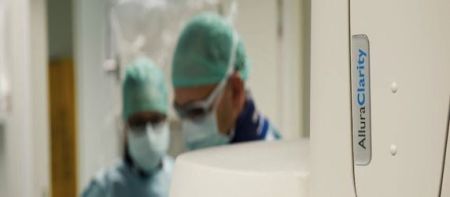Philips, the Radboud University Nijmegen Medical Centre (Nijmegen, the Netherlands) and Main-Taunus Cardiac Center (Bad Soden, Germany) announced the results of a clinical study that demonstrate that the safety for patients and clinicians can be significantly enhanced during cardiac interventions.
Using Philips’ recently introduced AlluraClarity system* with ClarityIQ technology, the doctors of the medical centre were, for the first time, able to achieve a 50 percent reduction in X-ray dose while maintaining the excellent image quality needed during image-guided cardiac interventions. The results will be presented during the annual congress of the European Association for Percutaneous Cardiovascular Interventions (EuroPCR), 21 – 24 May in Paris.
The clinical study was designed by Main-Taunus Cardiac Center and conducted at the Radboud University Nijmegen Medical Centre between September and November 2012 involving 39 patients with a BMI range of 20 – 37. During the study, two coronary angiography scans of the same patient were compared: for the first scan conventional interventional X-ray technology was used, while for the second scan Philips’ ClarityIQ technology was used. Six independent interventional cardiologists from across Europe (Italy, France, Germany, the Netherlands and Sweden) then evaluated the image quality of these scans, and concluded that compared to conventional X-ray technology, AlluraClarity provided equivalent image quality at 50 percent less X-ray dose.
“We have extensively explored and tested this new technology at our cardiac center”, said Prof. Dr. med. N. Reifart, co-author of the study and Director of the Main-Taunus Cardiac Center, Private Clinic Bad Soden. “It now enables us to perform most diagnostic angiographies with at least 50 percent lower radiation levels, equivalent to less than 1 mSv, with similar image quality as in the past”.
“Such a significant reduction in X-ray dose benefits both patients and the staff managing their care”, said Dr. T.J.F ten Cate, the cardiologist at the Radboud University Nijmegen Medical Centre and responsible for conducting the study. “Now that we are using AlluraClarity, we have become much more conscious about X-ray radiation dose.”
The study results represent an important milestone for Philips, showcasing how complex interventional procedures can be performed with a significant reduction in X-ray dose. Last year, Philips announced that it had achieved a breakthrough with the same X-ray technology in endovascular procedures, in collaboration with the St. Antonius Hospital Utrecht/Nieuwegein (the Netherlands), a renowned center of expertise in the field of heart and vascular interventions. A study conducted at the Karolinska University Hospital (Sweden) in the field of neuroradiology demonstrated that AlluraClarity provides equivalent image quality at 73 percent less dose. Additional studies in the field of neuroradiology and electrophysiology are ongoing, with results expected later this year.
“Because of the intrinsic benefits for patients and care providers, there is a clear shift in healthcare from open surgery to minimally-invasive treatments,” commented Ronald Tabaksblat, General Manager, Philips Interventional X-Ray. “Live X-ray guidance is typically being used to perform such minimally invasive treatments. Our ClarityIQ technology significantly reduces the X-ray exposure required to produce high quality images, demonstrating that Philips is truly leading the way in improving the delivery of healthcare.”
Since its commercial introduction mid-2012, Philips has sold more than 200 AlluraClarity systems in regions such as Asia, Europe, the Middle East and Latin America.
For more information, please visit: www.philips.com/AlluraClarity
Latest Articles
Safety, Cardiac, Interventions
Philips, the Radboud University Nijmegen Medical Centre (Nijmegen, the Netherlands) and Main-Taunus Cardiac Center (Bad Soden, Germany) announced the resul...



























